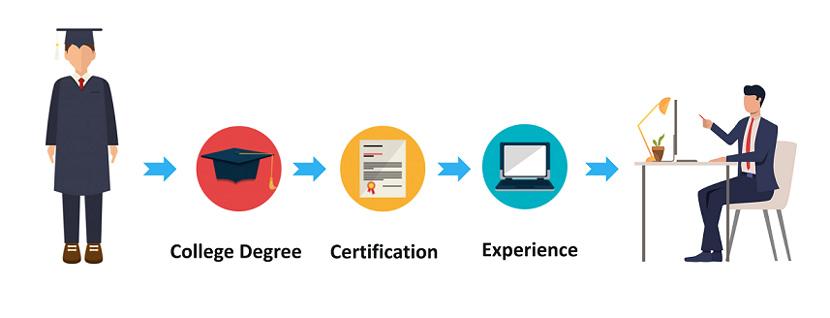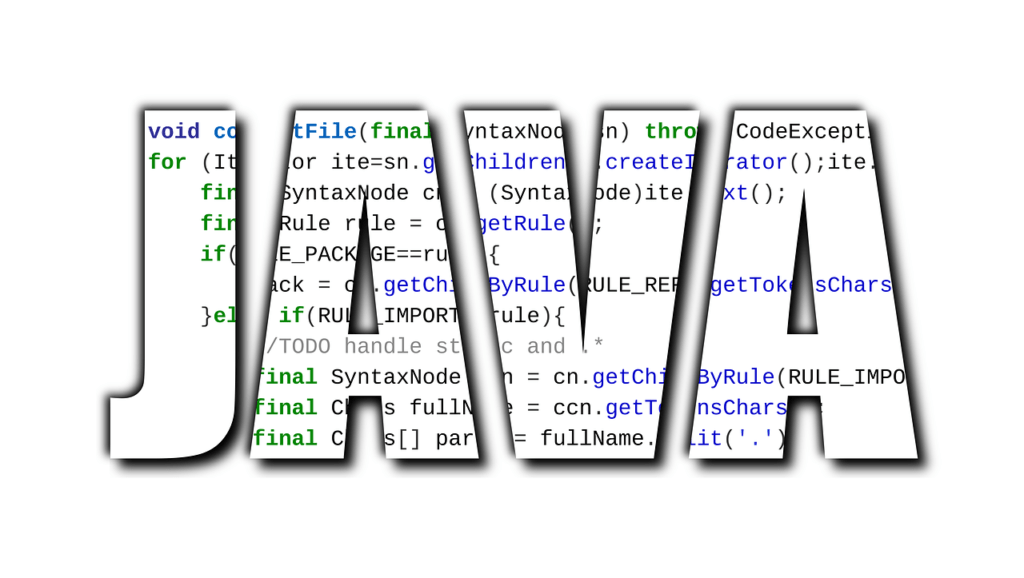Today, software is a critical element of the digital age. As a result, the saying “software dominates the world” has become the catchphrase of many of us.
It has led to the ubiquitous presence of programmers in the field. Specifically, they can play important roles in music, movies, entertainment, retail, and shipping industries.
Java is one of the good languages to learn while stepping into the software. So, it is challenging to find the answer to how to become a java developer.
This article will give you a 6-steps roadmap to becoming a successful developer in this field. So, let’s get started!
How To Become a Java Developer
If you want to become a potential developer in this field, following the right path is essential.

Here’s a six-step path that will allow you to build the skills you need to advance your career.
1. Get knowledge about Java
Many potential candidates start by learning how to code in this programming language. Various Useful Resources for the Short Course
- Podcasts
- Tutorial
- Book
If you need an easy tutorial for anyone to understand, we recommend choosing the Oracle tutorial. It is comprehensive and completely free.
If you want to touch budding developers, it is possible to utilize subreddits, such as r/LearnJava.
This subreddit allows you to find valuable resources related to your field, book recommendations, and posts from somebody looking for feedback from others on their code.
2. Advanced Project Management Skill
When acquiring knowledge in this area, you should also improve your project management skill.
For this step, you can familiarize yourself with planning, designing, and building small projects with the programming language you aim for.
Managing small-scale projects will allow you to improve your project management skills. Thanks to it, you have several categories to highlight your application, making the recruiters evaluate you higher than other candidates.
You can also enhance your application by completing one Java certificate.
3. Join Communities to Get Knowledge From Peers
We recommend joining at least one community in this area as they allow you to gain knowledge from your peers. It is a great way to improve your technical knowledge and sharpen your problem-solving skills.
By watching other professionals solve their problems, you can also learn to think like an expert in the field.
Many great communities are available online. So join them now!
4. Improve Your Skill and Develop Your Portfolio
This step indicates practicing your new skills and building a portfolio of your own, which will help you stand out from other potential candidates.
You should mention the goal of creating Java apps for this portfolio (include one web application or more).
You do not have to end up with overly complex projects. Instead, choose a simple option that can demonstrate that you can develop various applications with this programming language.
You also don’t have to make your portfolio too perfect. But, in general, your portfolio should focus on two things:
- Tell the employer about yourself in the “about me” section. This section needs to clarify a few aspects, such as skills, experience, and interests.
- Show employers your skills by mentioning projects you’ve worked on. Ideally, mention three to five projects. It is wise to include a short description of these projects, screenshots of their development, and more.
5. Build A Resume To Apply for A Position That You Wish
Once you’ve mastered this programming language and can build a few small-scale applications, it’s time to build the resume for applying for a job.
When creating this resume, you need to include your new skills relevant to the Java developer position. They can be:
- Java development skill
- Code testing skill
- Vendor liaison skill
- Project management skill
- SQL knowledge
- OOP knowledge
- And more
In addition, soft skills are also crucial for this job, and you should also mention them in your resume. These soft skills could be:
- Problem-solving skill
- Communication skill
- Teamwork skill
- And more
It is possible to find a job on popular platforms, such as:
- Indeed
- IT Career Finder
- Monster
- ITJobBoard.net
- And more
6. Constantly Improving Related Skills
Whether you have become a developer in this field, never stop improving your Java skills.
It ensures long-term success in your computer science career, allowing you to take on larger and more complex projects.
Java Programming Language Overview
What is Java? It is a prevalent and well-known programming language developers utilize for web, software, and mobile development.
So, it’s not surprising that many large enterprise applications choose this programming language, especially in finance or large transaction systems.
It is also a powerful platform for app development. It is a good candidate for big systems that require high stability and fine load capacity to meet the job requirements.

The idea of this programming language originally came in the 1990s from a group called the “Green Team.” James Gosling, who would later be considered the father of this language, was also a member of “the Green Team.”
Gosling developed this programming language when he was an engineer at Sun Microsystems, a subsidiary of Oracle today.
Initially, it was designed to:
- Robust
- Portable
- Simple
- Secured
- Platform-independent
- High Performance
- Architecture Neutral
- Multithreaded
- Dynamic
- Interpreted
Its birth led to many of today’s modern programming languages, which are derived from it, including JavaScript, Python, PHP, and Scala. Yet, it’s still one of the most famous programming languages that’s most worth learning.
What Is a Java Developer?
The responsibilities of Java developers are often designing or developing web, desktop, IoT (internet of things), Java-based applications.
They usually work in groups. In addition, they also need to work with:
- Designers
- Other Developers
- Project stakeholders
- Project or Product Manager
- Scrum Master
They seem to be necessary to most industries, for example:
- Software
- Finance
- Healthcare
- Government projects
- Web applications
- Space exploration
- Self-driving cars
- And more
Developers in this field can find full-time on-site, remote, or freelance work.
Their average working time is about 40 hours a week. However, sometimes they will work overtime to complete the code to meet the deadline.
These programmers usually work alone but can sometimes collaborate with engineers and software developers. Yet, they usually work in front of the computer most of their working time.
The responsibilities of these professionals may vary for each organization or company. However, most of them will spend their workday to:
- Responding to emails
- Attending team meetings
- Coding
- Modeling data
- Designing software or system architectures
- Researching alternative technologies
- And more
What Does a Java Developer Do?
As a developer in this field, your duties and responsibilities in an organization will depend on your level.
Entry-Level Developer
As an entry-level developer, the chances are high that you only have limited professional experience. So, you’ll spend most of your work time:
- Develop the Java programming skills
- Fix basic bugs
- Perform testing
- Write basic code
- Create end-user documentation
- Help your team to plan Java projects
- And more
Mid-Level Developer
This level will typically require two to five years of experience. At this point, you should have a solid knowledge base of your company’s IT architecture.
Once your skill and knowledge are higher than entry-level developers, it’s time to spend your time working on:
- Fix more complicated bugs
- Write more advanced codes
- Plan Java projects
- Perform (or oversee) testing
- Create end-user-documentation
- Manage junior developers
- Work with vendors
- And more
Senior Developer
If you want to be a senior developer, you will need more than five years of experience. You will also need a deep background of knowledge of your company’s IT systems and expertise in various projects in the field.
Senior developers often spend their working time to:
- Plan, consult, and review sophisticated projects
- Oversee the development’s financial side
- Oversee work done by junior members
- Work with vendors
- And more
Generally, the size of your company will determine your daily duties and tasks.
What Are the Responsibilities of Java Devs?
The responsibility that you must fulfill will depend on the company’s needs, and it can vary from company to company. Yet, most of these developers have the following roles:
- Work with IT vendors that deliver your company with software, infrastructure, platforms, etc.
- Liaise with the IT team
- Develop code
- Test code
- Debug software problems
- Understand program architecture
- Prepare updates
- Prepare end-user documentation
- And more
What Skills Are Needed to Be a Java Developer?

If you want to be successful in this area, it is essential to master several skills, including:
Java Development Capabilities
Programmers in the field can be required to generate code from scratch for tons of web-based projects and non-web-based ones.
As a result, it is essential to understand Java well and be able to apply it to create new projects, fix bugs, and update. In addition, they can also:
- Distinguish between Java SE, Java Tag, Java EE, and Java ME.
- Utilize development suites, such as DevKinsta.
- Utilize familiar Java frameworks, such as the Hibernate framework or Spring framework.
Code Testing Skill
These developers will likely be responsible for testing their code before deployment. So, they will usually need to learn:
- Testing functionality
- Testing static code
- Testing unit
- Testing the performance of single-user.
Project Management Skill
Developers in this area should also follow SDLC (the Systems Development Lifecycle). So, we recommend you understand how to take your projects via the following six-phase:
- Phase 1: Planning
- Phase 2: Analysis
- Phase 3: Design
- Phase 4: Implementation
- Phase 5: Test and integration
- Phase 6: Maintenance
Hence, it’s wise to become familiar with the waterfall or other agile approaches to project your management.
SQL Skill
When working with Javas, you will sometimes need to use SQL (Structured Query Language) when producing and utilizing databases.
So, the best thing is to learn to understand how to use this language. Besides, you are also advised to familiarize yourself with the Microsoft SQL, MySQL, and Oracle 12c database systems.
Project Architecture Skill
As an expert in this critical area, you may be responsible for designing and building the project from scratch.
So, it is essential to know how to construct your projects’ architecture to be extendable long-term, logical, and consistent.
Knowledge Of Object-Oriented Programming (OOP)
Since you are working with an OOP language, it is essential to clearly understand the four OOP principles and the OOP development’s SOLID principles.
Vendor Liaison Skill
While working in this position, you will also need to communicate with other developers, IT vendors, or your superiors.
So, it’s always best to improve your negotiation skills and build relationships with others. It will make communication between you and other people smoother and more accessible.
What Is the Salary of Java Developers?
The developers in this area are always highly skilled in accomplishing various jobs and responsibilities. So, no doubt, they get very high salaries.
According to data from our latest report, in the United States, the average annual salary of Java developers is $98,605. About half of the full-time developers have annual salaries ranging from $94,622 to $148,091.
The salary you receive depends on many factors, including:
- Your number of years of experience
- Your education level
- Your business (its profits)
- Your position
- Overtime
- Your bonus
- And more
The Bottom Line
In general, knowledge of programming languages is limitless. If you have chosen to become a programmer in this field, it is essential to stay up to date with new trends promptly.
On the other hand, while developing your career in this field, focus only on the necessary knowledge. Don’t try to dig into every topic that isn’t necessary to achieve your Java learning goals.
Thank you for reading! We wish you success in this field!
